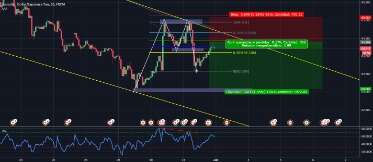
When you invest in futures, you actually are signing a contract as opposed to buying part of a company. The contract stipulates that, at a point in the future, you will pay a certain price for the asset underlying the contract. In effect, you are placing a bet that the underlying asset will cost a certain price on a certain day, the expiration day of the futures contract. Futures are generally short-term investments with a maturity of one year or less. Futures and futures options trading involves substantial risk and is not suitable for all investors.
When you buy a futures contract, you typically do not have to pay all the money at that time. Instead, you can use your brokerage account and pay part of the value of the contract and borrow the rest from your broker. Since futures contracts are marked to market daily, you may have to deposit more money to your margin account off and on to meet your margin requirements.
Information transmission across stock indices and stock index futures: International evidence using wavelet framework
Alternatively, the option buyer can simply sell the call and pocket the profit, since the call option is worth $10 per share. If the option is trading below $50 at the time the contract expires, the option is worthless. The call buyer loses the upfront payment for the option, called the premium. Commissions on future trades are very low and are charged when the position is closed. The total brokerage or commission is usually as low as 0.5% of the contract value.
However, futures-related volatility shifts alter the proportionality of this relation in a predictable fashion. Our model also predicts structural shifts in the relation between cross-sectional dispersion and spot portfolio (and average) volatility when futures trading begins. Options on futures are not suitable for all clients and the risk of loss in trading futures and options on futures could be substantial. Additionally some options expire prior to the final settlement or expiration of the underlying futures contract.
Volatility forecasting in commodity markets using macro uncertainty
Securities and Exchange Commission (“SEC”) as a Broker-Dealer and with the CFTC as a Futures Commission Merchant and Commodity Trading Adviser. References to securities trading are made on behalf of the BD Division of SFI and are intended only for an audience of institutional clients as defined by FINRA Rule 4512(c). References to exchange-traded futures and options are made on behalf of the FCM Division of SFI. The market for futures has expanded greatly beyond oil and corn. Futures can be purchased on an index like the S&P 500, and on individual stocks in some jurisdictions. (Single-stock futures have not been available in the U.S. since 2020.) Buyers of a futures contract are not required to pay the full value of the contract up front.
- We propose new tests to examine whether stock index futures affect stock market volatility.
- Because margin magnifies both profits and losses, it’s possible to lose more than the initial amount used to purchase the stock.
- You do have cash flows if you invest in futures based on daily mark to the market, but they could be either cash inflows into your account or cash outflows.
References to over-the-counter (“OTC”) products or swaps are made on behalf of StoneX Markets LLC (“SXM”), a member of the National Futures Association (“NFA”) and provisionally registered with the U.S. Commodity Futures Trading Commission (“CFTC”) as a swap dealer. SXM’s products are designed only for individuals or firms who qualify under CFTC rules as an ‘Eligible Contract Participant’ (“ECP”) and who have been accepted as customers of SXM. StoneX Financial Inc. (“SFI”) is a member of FINRA/NFA/SIPC and registered with the MSRB. SFI does business as Daniels Trading/Top Third/Futures Online.
Micro E-Mini Futures Contracts
Aside from the differences noted above, there are other things that set options and futures apart. Here are some other major differences between these two financial instruments. Option holders do not own the underlying shares or enjoy shareholder rights unless they exercise an option to buy stock.

Financial speculators typically don’t intend to acquire the underlying commodity when the contract is settled, and are likely to sell their position beforehand. An investor buys a call option to buy stock XYZ at a $50 strike price sometime within the next three months. If the stock jumps to $60, the call buyer can exercise the right to buy the stock at $50. That buyer can then immediately sell the stock for $60 for a $10 profit per share. Owning shares of stock confers voting rights on some company affairs and the right to attend the company’s annual shareholder meeting. Your shares represent ownership of the company’s assets and a right to benefit from its future earnings (typically reported on a per-share basis).



